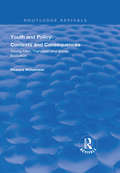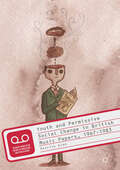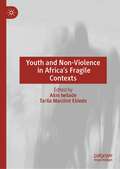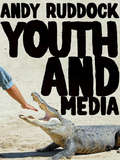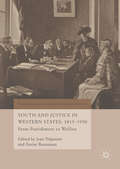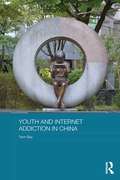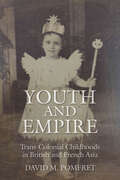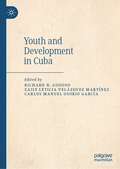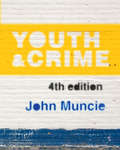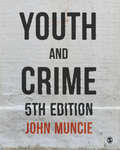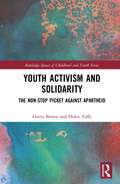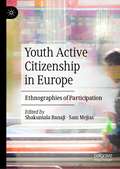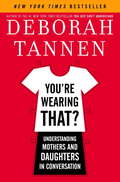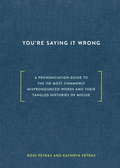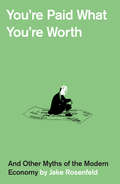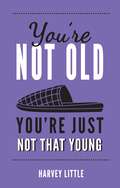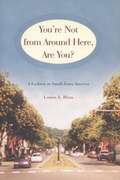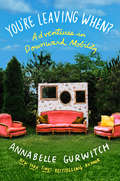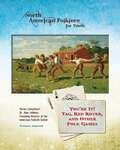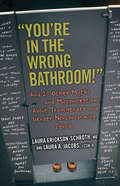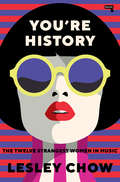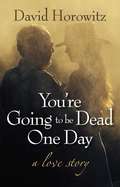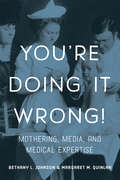- Table View
- List View
Youth and Policy: Contexts and Consequences (Routledge Revivals)
by Howard WilliamsonFirst published in 1997, this volume is concerned primarily, though not exclusively, with one particular vulnerable group: unqualified young men on the margins. These young men, whose cultures of machismo, manualism and anti-mentalism previously served to prepare them for the manual labour market, are increasingly the careerless, the jobless and the folk-devils of the modern, post-industrial society. In research, they have received considerable attention, though more for their capacity to be spectacular, deviant and bizarre than through the deep anxieties and despondency about the future experienced by many. Howard Williamson contends that the development of effective youth policy depends essentially upon a synthesis of political priorities, professional agendas and young people’s perspectives and responses. While not quite an ‘underclass’, many suffer from a ‘tangle of pathologies’ which obstructs the possibility of them finding a way back into mainstream economic, housing and relationship transitions.
Youth and Permissive Social Change in British Music Papers, 1967–1983 (Palgrave Studies In The History Of Subcultures And Popular Music Ser.)
by Patrick GlenThis book is a work of press history that considers how the music press represented permissive social change for their youthful readership. Read by millions every week, the music press provided young people across the country with a guide to the sounds, personalities and controversies that shaped British popular music and, more broadly, British culture and society. By analysing music papers and oral history interviews with journalists and editors, Patrick Glen examines how papers represented a lucrative entertainment industry and mass press that had to negotiate tensions between alternative sentiments and commercial prerogatives. This book demonstrates, as a consequence, how music papers constructed political positions, public identities and social mores within the context of the market. As a result, descriptions and experiences of social change and youth were contingent on the understandings of class, gender, sexuality, race and locality.
Youth and Non-Violence in Africa’s Fragile Contexts
by Akin Iwilade Tarila Marclint EbiedeThis book makes an important contribution to the conflict literature and to new ways of thinking about agency and social life in fragile contexts. It does this by engaging with often ignored peace infrastructures. In this book, the contributors highlight different ways in which non-violence is deployed by Africa’s youth to navigate difficult violent contexts. Drawing on empirically grounded case studies from the Central African Republic to Zimbabwe, this book explores how similar (or indeed the same) social infrastructures can be deployed for both violence and non-violence and the important factors that drive many youth to take the non[1]violence option even when order appears to collapse around them. The authors also explore how, for instance, systems of organizing survive violent disruptions to the so-called rhythms of everyday life, and, when they do, how they are then repurposed by youth to help them survive violence.
Youth and Media
by Andy RuddockWhen societies worry about media effects, why do they focus so much on young people? Is advertising to blame for binge drinking? Do films and video games inspire school shootings? Tackling these kinds of questions, Youth and Media explains why young people are at the centre of how we understand the media. Exploring key issues in politics, technology, celebrity, advertising, gender and globalization, Andy Ruddock offers a fascinating introduction to how media define the identities and social imaginations of young people. The result is a systematic guide to how the notion of media influence 'works' when daily life compels young people to act out their relationships through media content and technologies. Complete with helpful chapter guides, summaries and lively case studies drawn from a truly global context, Youth and Media is an engaging and accessible introduction to how the media shape our lives. This book is ideal for students of media studies, communication studies and sociology.
Youth and Justice in Western States, 1815-1950: From Punishment To Welfare (World Histories of Crime, Culture and Violence)
by Jean Trépanier Xavier RousseauxThis book explores the treatment of junevile offenders in modern Western history. The last few decades have witnessed major debates over youth justice policies. Juvenile and youth justice legislation has been reviewed in a number of countries. Despite the fact that new perspectives, such as restorative justice, have emerged, the debates have largely focused on issues that bring us back to the inception of juvenile justice: namely whether youth justice ought to be more akin to punitive adult criminal justice, or more sensitive to the welfare of youths. This issue has been at the core of policy choices that have given juvenile justice its orientations since the beginning of the twentieth century. It also gave shape to the evolution that paved the way for the creation of juvenile courts in the nineteenth century. Understanding those early debates is essential if we are to understand current debates, and place them into perspective. Based on primary archival research, this comprehensive study begins by presenting the roots, birth and evolution of juvenile justice, from the nineteenth century up to the beginning of the twenty-first. The second part deals with nineteenth century responses to juvenile delinquency in England and Canada, while the third focuses on the welfare orientation that characterized juvenile courts in the first half of the twentieth century in Switzerland, the Netherlands, Germany and Belgium. Finally, the fourth part focuses on the perspective of the youths and their families in Belgium, France and Canada.
Youth and Internet Addiction in China (Routledge Culture, Society, Business in East Asia Series)
by Trent BaxA form of 'electronic opium' is how some people have characterised young people’s internet use in China. The problem of 'internet addiction' (wangyin) is seen by some parents as so severe that they have sought psychiatric help for their children. This book, which is based on extensive original research, including discussions with psychiatrists, parents and 'internet-addicted' young people, explores the conflicting attitudes which this issue reveals. It contrasts the views of young people who see internet use, especially gaming, as a welcome escape from the dehumanising pressures of contemporary Chinese life, with the approach of those such as their parents, who medicalise internet overuse and insist that working hard for good school grades is the correct way to progress. The author shows that these contrasting attitudes lead to battles which are often fierce and violent, and argues that the greater problem may in fact lie with parents and other authority figures, who misguidedly apply high pressure to enforce young people to conform to the empty values of a modern, dehumanised consumer-oriented society.
Youth and Empire
by David PomfretThis is the first study of its kind to provide such a broadly comparative and in-depth analysis of children and empire. Youth and Empire brings to light new research and new interpretations on two relatively neglected fields of study: the history of imperialism in East and South East Asia and, more pointedly, the influence of childhood--and children's voices--on modern empires. By utilizing a diverse range of unpublished source materials drawn from three different continents, David M. Pomfret examines the emergence of children and childhood as a central historical force in the global history of empire in the late nineteenth and twentieth centuries. This book is unusual in its scope, extending across the two empires of Britain and France and to points of intense impact in "tropical" places where indigenous, immigrant, and foreign cultures mixed: Hong Kong, Singapore, Saigon, and Hanoi. It thereby shows how childhood was crucial to definitions of race, and thus European authority, in these parts of the world. By examining the various contradictory and overlapping meanings of childhood in colonial Asia, Pomfret is able to provide new and often surprising readings of a set of problems that continue to trouble our contemporary world.
Youth and Development in Cuba
by Richard N. Gioioso Zaily Leticia Velázquez Martínez Carlos Manuel Osorio GarcíaAs young people constitute the future development of Cuba, constant analysis of their diverse life experiences is necessary in new and diverse publications by a variety of researchers. This book examines how youth practices intersect with and are influenced by development – economic, human, psychological, social – and how young people negotiate and influence development trends in Cuba. The point of departure for Youth and Development in Cuba is a pluralistic understanding of youth(s) – that is, juventud(es) in Spanish – seen as an active generational subject, influenced sociohistorically, as a kind of collective identity. The collection of chapters from international scholars addresses issues relevant to young people, their experiences and participation in a variety of contexts and explores the diversity of factors that intervene in and shape the current problématiques of young people in Cuba’s eastern province of Holguín
Youth and Crime: A Critical Introduction
by John Muncie`Muncie''s book is a must-read for all criminologists interested in youth justice and youth crime. It is accessible, theoretically informed, empirically detailed and, thanks to the second edition, bang up-to-date'' - Professor Tim Newburn, London School of Economics `The first edition of Youth and Crime – published in 1999 – struck an almost unique balance between accessibility and complex scholarship. This substantially revised and up-dated edition takes the depth and scope of the key debates further still. Muncie draws on a wide range of scholarly research, he engages with major theoretical questions and he interrogates the complexities and contradictions of policy formation. . . . Without doubt this is an indispensable source for sociology, criminology, social policy, social history, social work, youth justice and media and cultural studies students and tutors alike'' - Dr Barry Goldson, Senior Lecturer in Sociology and Social Policy, The University of Liverpool. `The second edition of Youth and Crime is once again immensely scholarly and important for its insights into the shape of public, media and governmental responses to youth crime. The author produces new material on anti-social behaviour, street crime, victimisation, social exclusion, drugs and surveillance as well as on risk assessment, governance, globalisation and cultural criminology to help make sense of developments. . . . . As before, this is an excellent, accessible and lively introduction to youth crime and its regulation. It is a book that pushes debate forward in terms of questioning established knowledge and governmental responses to crime'' - Dr Loraine Gelsthorpe, Institute of Criminology, University of Cambridge. `Muncie observes, "the study of youth justice ultimately tells us more about social order, the state and political decision making than it does about the nature of young offending and the most effective ways to respond to it": the material he presents in this part of the book more than justifies the comment. Although this book is primarily a student text, it should interest magistrates and promote critical reflection'' - Magistrate · How and why have certain aspects of young people''s behaviour come to be perceived as `anti-social'' and ''criminal''? · Are young people now more of a threat than ever before? · How can we make sense of New Labour''s youth justice reforms? · Is the youth justice system soft on crime? · Are young people more in need of protection than disciplinary punishment? The Second Edition of this best-selling text provides a fully revised and up-to-date critical analysis of a wide range of issues surrounding young people, disorder and crime. To develop a comprehensive criminology of youth the book deliberately moves beyond traditional criminological concerns and draws insights from other academic disciplines such as cultural studies, gender studies, media studies, social policy, social work, political science and human geography. Now thoroughly updated, this second edition has been rewritten to include new material on anti-social behaviour, street crime, youth gangs, victimisation, social exclusion, drugs, surveillance, crime prevention, policing and restoration as well as a sustained critical analysis of New Labour''s youth, social and criminal justice reforms as they have emerged over the past five years. To make sense of these developments theories of risk management, governance, globalisation and cultural criminology are introduced and assessed. An original and accessible text, it provides invaluable support for further study by featuring key concepts, a glossary, summaries of the main arguments, study questions and guides to further reading. Building on the strengths of the first edition, this highly influential work remains the most integrated and comprehensive analysis of theory, research, policy and politics in this area. It is an essential text for students of criminology, criminal justice, sociology, youth studies, social policy and social work.
Youth and Crime
by John MuncieThe most comprehensive and authoritative textbook on youth crime and youth justice. Extensively updated to reflect changes in the youth justice system and contemporary debates around youth crime, this fifth edition of Youth and Crime: Includes new chapters on developmental and life course theories, and punitive justice strategies. Has been significantly expanded with new sections on the politicisation of youth crime, knife crime and gangs, child refugees, climate justice, child-on-child homicide, and localised criminal exploitation. Features increased coverage of policing strategies, including sections on policing public space and rethinking youth justice. Complete with a new two colour design, chapter outlines, summary boxes, study questions, further reading lists, useful website lists, and a glossary, this textbook expertly guides students through their studies in youth and crime.
Youth and Crime
by John MuncieThe most comprehensive and authoritative textbook on youth crime and youth justice. Extensively updated to reflect changes in the youth justice system and contemporary debates around youth crime, this fifth edition of Youth and Crime: Includes new chapters on developmental and life course theories, and punitive justice strategies. Has been significantly expanded with new sections on the politicisation of youth crime, knife crime and gangs, child refugees, climate justice, child-on-child homicide, and localised criminal exploitation. Features increased coverage of policing strategies, including sections on policing public space and rethinking youth justice. Complete with a new two colour design, chapter outlines, summary boxes, study questions, further reading lists, useful website lists, and a glossary, this textbook expertly guides students through their studies in youth and crime.
Youth Activism and Solidarity: The non-stop picket against Apartheid (Routledge Spaces of Childhood and Youth Series)
by Gavin Brown Helen YaffeFrom April 1986 until just after Nelson Mandela’s release from prison in February 1990, supporters of the City of London Anti-Apartheid Group maintained a continuous protest, day and night, outside the South African Embassy in central London. This book examines how and why a group of children, teenagers and young adults made themselves ‘non-stop against apartheid’, creating one of the most visible expressions of anti-apartheid solidarity in Britain. Drawing on interviews with over ninety former participants in the Non-Stop Picket of the South African Embassy and extensive archival research using previously unstudied documents, this book offers new insights to the study of social movements and young people’s lives. It theorises solidarity and the processes of adolescent development as social practices to provide a theoretically-informed, argument-led analysis of how young activists build and practice solidarity. Youth Activism and Solidarity: The Non-Stop Picket Against Apartheid will be of interest to geographers, historians and a wide range of other social scientists concerned with the historical geography of the international anti-apartheid movement, social movement studies, contemporary British history, and young people’s activism and geopolitical agency.
Youth Active Citizenship in Europe: Ethnographies of Participation
by Shakuntala Banaji Sam MejiasThis volume engages with the contested concept of ‘active citizenship’. It analyses the use and understanding of active citizenship in youth civic and political initiatives in the Czech Republic, Estonia, Germany, Italy, Portugal and the UK. Using ethnographic data and insights from the cross-European project CATCH-EyoU, the contributors to this collection illuminate the experiences of young people taking action for social change. It does so at a unique moment when a resurgent populist political right is deploying racial prejudice and neoliberal protectionism in both established media and new digital media to fuel xenophobic nationalism. The book asks a range of questions, including: What is life like for active young citizens with an interest in the civic and political spheres? What practices, relationships and motivations characterise their participatory movements, organisations, initiatives and groups? The chapters use case studies to analyse how friendship and emotion, social media, diversity-work, racism, precarity and burnout feed into motivating and developing or curtailing sustained pro-democratic activism.Youth Active Citizenship in Europe will be of interest to students and scholars across a range of disciplines including politics, sociology, education and cultural studies.
You're Wearing That?
by Deborah TannenDeborah Tannen's #1 New York Times bestseller You Just Don't Understand revolutionized communication between women and men. Now, in her most provocative and engaging book to date, she takes on what is potentially the most fraught and passionate connection of women's lives: the mother-daughter relationship.It was Tannen who first showed us that men and women speak different languages. Mothers and daughters speak the same language-but still often misunderstand each other, as they struggle to find the right balance between closeness and independence. Both mothers and daughters want to be seen for who they are, but tend to see the other as falling short of who she should be. Each overestimates the other's power and underestimates her own. Why do daughters complain that their mothers always criticize, while mothers feel hurt that their daughters shut them out? Why do mothers and daughters critique each other on the Big Three-hair, clothes, and weight-while longing for approval and understanding? And why do they scrutinize each other for reflections of themselves? Deborah Tannen answers these and many other questions as she explains why a remark that would be harmless coming from anyone else can cause an explosion when it comes from your mother or your daughter. She examines every aspect of this complex dynamic, from the dark side that can shadow a woman throughout her life, to the new technologies like e-mail and instant messaging that are transforming mother-daughter communication. Most important, she helps mothers and daughters understand each other, the key to improving their relationship.With groundbreaking insights, pitch-perfect dialogues, and deeply moving memories of her own mother, Tannen untangles the knots daughters and mothers can get tied up in. Readers will appreciate Tannen's humor as they see themselves on every page and come away with real hope for breaking down barriers and opening new lines of communication. Eye-opening and heartfelt, You're Wearing That? illuminates and enriches one of the most important relationships in our lives."Tannen analyzes and decodes scores of conversations between moms and daughters. These exchanges are so real they can make you squirm as you relive the last fraught conversation you had with your own mother or daughter. But Tannen doesn't just point out the pitfalls of the mother-daughter relationship, she also provides guidance for changing the conversations (or the way that we feel about the conversations) before they degenerate into what Tannen calls a mutually aggravating spiral, a "self-perpetuating cycle of escalating responses that become provocations." - The San Francisco Chronicle From the Hardcover edition.
You're the Only One I've Told: The Stories Behind Abortion
by Meera ShahFor a long time, when people asked Dr. Meera Shah what she did, she would tell them she was a doctor and leave it at that. But over the last few years, Shah decided it was time to be direct. "I'm an abortion provider," she will now say. And an interesting thing started to happen each time she met someone new. One by one, people would confide—at BBQs, at jury duty, in the middle of the greeting card aisle at Target— that in fact they'd had an abortion themselves. And the refrain was often the same: You're the only one I've told. This book collects those stories as they've been told to Shah to humanize abortion and to combat myths that persist in the discourse that surrounds it. An intentionally wide range of ages, races, socioeconomic factors and experiences, shows that abortion does not happen in a vacuum—it always occurs in a unique context. Today, abortion has become a core political litmus test for party loyalty. A healthcare issue that's so precious and foundational to reproductive, social, and economic freedom for millions of people is exploited by politicians who lack understanding or compassion about the context in which abortion occurs. Stories have power to break down stigmas and help us to empathize with those whose experiences are unlike our own. They can also help us find community and a shared sense of camaraderie over experiences just like ours. You're the Only One I've Told will do both.
You're Saying It Wrong: A Pronunciation Guide to the 150 Most Commonly Mispronounced Words--and Their Tangled Histories of Misuse
by Ross Petras Kathryn PetrasFor word nerds and grammar geeks, an illustrated guide to the most commonly mispronounced words, along with their correct pronunciations and pithy forays into their fascinating etymologies and histories of use and misuse.With wit and good humor, this handy little book not only saves us from sticky linguistic situations but also provides fascinating cocktail-party-ready anecdotes. Entries reveal how to pronounce boatswain like an old salt on the deck of a ship, trompe l'oeil like a bona fide art expert, and haricot vert like a foodie, while arming us with the knowledge of why certain words are correctly pronounced the "slangy" way (they came about before dictionaries), what stalks of grain have to do with pronunciation, and more. With bonus sidebars like "How to Sound like a Seasoned Traveler" and "How to Sound Cultured," readers will be able to speak about foreign foods and places, fashion, philosophy, and literature with authority.From the Hardcover edition.
You’re Paid What You’re Worth: And Other Myths Of The Modern Economy
by Jake RosenfeldA myth-busting book challenges the idea that we’re paid according to objective criteria and places power and social conflict at the heart of economic analysis.Your pay depends on your productivity and occupation. If you earn roughly the same as others in your job, with the precise level determined by your performance, then you’re paid market value. And who can question something as objective and impersonal as the market? That, at least, is how many of us tend to think. But according to Jake Rosenfeld, we need to think again.Job performance and occupational characteristics do play a role in determining pay, but judgments of productivity and value are also highly subjective. What makes a lawyer more valuable than a teacher? How do you measure the output of a police officer, a professor, or a reporter? Why, in the past few decades, did CEOs suddenly become hundreds of times more valuable than their employees? The answers lie not in objective criteria but in battles over interests and ideals. In this contest four dynamics are paramount: power, inertia, mimicry, and demands for equity. Power struggles legitimize pay for particular jobs, and organizational inertia makes that pay seem natural. Mimicry encourages employers to do what peers are doing. And workers are on the lookout for practices that seem unfair. Rosenfeld shows us how these dynamics play out in real-world settings, drawing on cutting-edge economics, original survey data, and a journalistic eye for compelling stories and revealing details.At a time when unions and bargaining power are declining and inequality is rising, You’re Paid What You’re Worth is a crucial resource for understanding that most basic of social questions: Who gets what and why?
You're Not Old, You're Just Not That Young: The Funny Thing About Getting Older
by Harvey LittleYou might not be a spring chicken any more, but that doesn’t mean you shouldn’t keep on strutting your stuff! This collection of witty quotations, light-hearted yarns and cheerful jokes will help you stay young at heart, and see the funny side of getting older with a smile on your face.
You're Not from Around Here, Are You: A Lesbian in Small-Town America
by Louise A. BlumThis is a funny, moving story about life in a small town, from the point of view of a pregnant lesbian. Louise A. Blum, author of the critically acclaimed novel Amnesty, now tells the story of her own life and her decision to be out, loud, and pregnant. Mixing humor with memorable prose, Blum recounts how a quiet, conservative town in an impoverished stretch of Appalachia reacts as she and a local woman, Connie, fall in love, move in together, and determine to live their life together openly and truthfully. The town responds in radically different ways to the couple’s presence, from prayer vigils on the village green to a feature article in the family section of the local newspaper. This is a cautionary, wise, and celebratory tale about what it’s like to be different in America—both the good and the bad. A depiction of small town life with all its comforts and its terrors, this memoir speaks to anyone who has ever felt like an outsider in America. Blum tells her story with a razor wit and deft precision, a story about two "girls with grit," and the child they decide to raise, right where they are, in small town America.
You're Leaving When?: Adventures in Downward Mobility
by Annabelle GurwitchFrom the New York Times bestselling author of I See You Made an Effort comes a timely and hilarious chronicle of downward mobility, financial and emotional. With signature "sharp wit" (NPR), Annabelle Gurwitch gives irreverent and empathetic voice to a generation hurtling into their next chapter with no safety net and proves that our no-frills new normal doesn't mean a deficit of humor.In these essays, Gurwitch embraces homesharing, welcoming a housing-insecure young couple and a bunny rabbit into her home. The mother of a college student in recovery who sheds the gender binary, she relearns to parent, one pronoun at a time. She wades into the dating pool in a Miss Havisham-inspired line of lingerie and flunks the magic of tidying up.You're Leaving When? is for anybody who thought they had a semblance of security but wound up with a fragile economy and a blankie. Gurwitch offers stories of resilience, adaptability, low-rent redemption, and the kindness of strangers. Even in a muted Zoom.
You're It! Tag, Red Rover, and Other Folk Games (North American Folklore for Youth)
by Thomas ArkhamHave you ever played cards on a rainy afternoon? Do you and your friends play jump rope, play hide-and-go-seek, or play Red Rover? If you did, then you were enjoying a folk game. Learn more about these games, including the long history behind: * face cards * tag * hide-and-go-seek * some board games * baseball. Games help us deal with life. They give us physical exercise. They challenge our minds . . . and most of all they fill our lives with fun.
"You're in the Wrong Bathroom!": And 20 Other Myths and Misconceptions About Transgender and Gender-Nonconforming People
by Laura A. Jacobs Laura Erickson-SchrothDebunks the twenty-one most common myths and misperceptions about transgender issuesFrom Laverne Cox and Caitlyn Jenner to Thomas Beatie (“the pregnant man”) and transgender youth, coverage of trans lives has been exploding—yet so much misinformation persists. Bringing together the medical, social, psychological, and political aspects of being trans in the United States today, “You’re in the Wrong Bathroom!”: And 20 Other Myths About Transgender and Gender-Nonconforming People unpacks the twenty-one most common myths and misconceptions about transgender and gender-nonconforming people. Authors Laura Erickson-Schroth, MD, a psychiatrist, and Laura A. Jacobs, LCSW-R, a psychotherapist, address a range of fallacies:Trans People Are “Trapped in the Wrong Body”You’re Not Really Trans If You Haven’t Had “the Surgery”Trans People Are a Danger to Others, Especially ChildrenTrans People Are Mentally Ill and Therapy Can Change ThemTrans People and Feminists Don’t Get Along
You're History: The Twelve Strangest Women in Music
by Lesley ChowRaucous, sensual and sublime: how twelve pioneering female artists rewrote the rules of pop.From Kate Bush to Nicki Minaj, from Janet Jackson to TLC and Taylor Swift, pop's greatest female pioneers are simply strange: smashing notions of taste and decorum, and replacing them with new ideals of pleasure. Instead of rehashing biographies, Lesley Chow dives deep into the music of these groundbreaking performers, identifying the ecstatic moments in their songs and finding out what makes them unique. You're History is a love letter to pop's most singular achievements, celebrating the innovations of women who are still critically underrated. It's a ride that includes tributes to Chaka Khan, Rihanna, Neneh Cherry, Sade, Shakespears Sister, Azealia Banks, and many more...
You're Going to be Dead One Day: A Love Story
by David HorowitzContinuing his acclaimed series of meditations on life and death, David Horowitz turns to the consolation that his marriage and family have brought him amid the trials of age and illness. You're Going to Be Dead One Day is a political warrior's reflection on the mysterious rejuvenating power of love, the bittersweet way in which our children reward us while also leaving us behind, and how kindnesses to others bring blessings home.
You're Doing it Wrong!: Mothering, Media, and Medical Expertise
by Bethany L. Johnson Margaret M. QuinlanNew mothers face a barrage of confounding decisions during the life-cycle of early motherhood which includes... Should they change their diet or mindset to conceive? Exercise while pregnant? Should they opt for a home birth or head for a hospital? Whatever they “choose,” they will be sure to find plenty of medical expertise from health practitioners to social media “influencers” telling them that they’re making a series of mistakes. As intersectional feminists with two small children each, Bethany L. Johnson and Margaret M. Quinlan draw from their own experiences as well as stories from a range of caretakers throughout. You’re Doing it Wrong! investigates the storied history of mothering advice in the media, from the newspapers, magazines, doctors’ records and personal papers of the nineteenth-century to today’s websites, Facebook groups, and Instagram feeds. Johnson and Quinlan find surprising parallels between today’s mothering experts and their Victorian counterparts, but they also explore how social media has placed unprecedented pressures on new mothers, even while it may function as social support for some. They further examine the contentious construction of prenatal and baby care expertise itself, as individuals such as everyone from medical professionals to experienced moms have competed to have their expertise acknowledged in the public sphere. Exploring potential health crises from infertility treatments to “better babies” milestones, You’re Doing it Wrong! provides a provocative look at historical and contemporary medical expertise during conception, pregnancy, childbirth, postpartum, and infant care stages.
